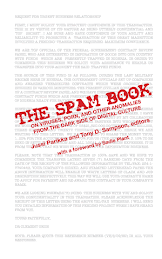Meditations after watching Doll House (and in the midst of the emerging genre of avatar/surrogate-films such as The Gamer, Surrogate, etc.):
Memories are valuable to any corporate/neoliberalist logic as pathways to subjectification. Subjectification works through capturing memory, and the Lockean idea of tabula rasa as the ground for subjectivity-through-experience is more of a pragmatic than ontological assumption. Contemporary capitalism works through creations of worlds, argues Maurizio Lazzarato, and Doll House exemplifies in this sense not (only) a world of high tech virtual realities, but the functioning of Leibnizian neoliberalism. It's about the refrains that stick to your mind, and create habits that pave the way for consumerist etc. behavior. Mind and body are hence synced. The other link to neoliberalism comes through Naomi Klein's Shock Doctrine: through shock that reduces to a childlike status the mind/society becomes open to reprogramming (thanks to Joss Hands for the reminder re. Klein.)
Lazzarato and his reading of Tarde is in many aspects an apt opening to such worlds as Doll House's. Subjectivity as an automate would be the perfect tuning of behaviors for a certain goal -- something clearly visible in the idea of being able to program people for specific tasks, and for such tasks only. (cf. Lazzarato's Les Révolutions du capitalisme). But this is not the whole truth. Memories leak, also through the tabula rasa. This is what Doll House is about; how memories while being captured, still leak, and how memory is less a storage space that can be filled and emptied according to will than a dynamism that cannot be detached from the body. Hence, memory becomes a dynamic engine with different layers suddenly converging and diverging. In Bergsonian terms, its the duration of lived memories that persists despite the quantified "memory bytes programmable" that seem to ground the fantasy of drone people á la 21st century.
Memory is much more material and dirty than anything that could be wiped away. It sticks. (An obvious direction would be to write this through Freud's memory machine metaphor, and talk about the dynamic materialism inherent in any process of imprinting/wiping.)
Where goes then the line between living and dead labour?
Agency is not one, nor is it even two as with doppelgangers, twins, or any other classic film doubling of minds/bodies. Its multiple, much more akin to a logic of infinite variation that characterizes digital technologies than an optical metaphor. But such avatars are not only projections stemming from the human, so to speak. They feed back. This seems to be something at the core of some of the media examples emerging now. There is a much more interesting feedback loop between bodies and avatars, minds and surrogates than only a projection of fantasmas. Bodies resonate with their spectral variations, and such spectral variations can return. (No return of the repressed through.)
Subscribe to:
Post Comments (Atom)








No comments:
Post a Comment